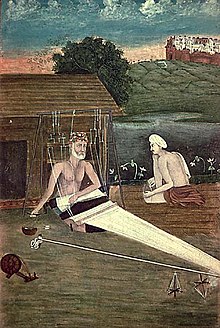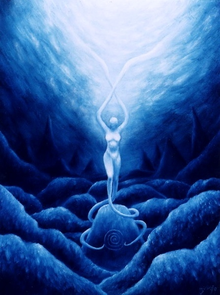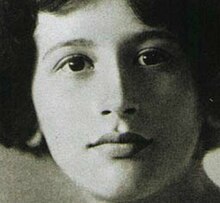Wakefulness
Appearance
(Redirected from Waking)

Wakefulness is a recurring state of awareness in which an individual is alert and engages in coherent cognitive communication, behavior and responses with events, objects, and other living beings in the common external world. Awakening is the process of emerging from sleep into wakefulness. Awakening and wakefulness are both often used metaphorically to designate progress from states of ignorance and confusion into those of knowledge, understanding, wisdom and enlightenment.
A
[edit]
- Despondency becomes not the dignity of our cause, nor the character of those who are its supporters. Let us awaken then, and evince a different spirit, — a spirit that shall inspire the people with confidence in themselves and in us, — a spirit that will encourage them to persevere in this glorious struggle, until their rights and liberties shall be established on a rock.
- Samuel Adams, addressing a meeting of delegates to the Continental Congress, assembled at Yorktown, Pennsylvania (September 1777), as quoted in The Life and Public Services of Samuel Adams (1865), by William Vincent Wells, Vol. 2, p. 492
- Wakefulness (yaqza) — may God encompass you in this matter with thoughts and ideas — is not to the exclusion of dreaming if the soul of the vigilant is awake and unblemished by evil and impurity. Dreaming, however, is more extraordinary, and man is more avid for it, for it is like a legacy one inherits, while wakefulness is like something gained by toil. And ardour for a vision is commensurate with this.
- Yahya b.’Adi, in Philosophy in the Renaissance of Islam : Abū Sulaymān Al-Sijistānī and His Circle (1986) by Joel L. Kraemer, p. 125
B
[edit]


And fears the waywardness of his thoughts Burns through every bond
With the fire of his vigilance. The simpleton who guards his mind And
fears his own confusion
Cannot fall. He had found his way to peace. ~ Gautama Buddha
- When the One who has realized God says, “I am God. You are God, and we are all one,” and also awakens this feeling of Oneness in his illusion-bound selves, then the question of the lowly and the great, the poor and the rich, the humble and the modest, the good and the bad, simply vanishes. It is his false awareness of duality that misleads man into making illusory distinctions and filing them into separate categories.
- Meher Baba, in Meher Baba’s Call (12 September 1954)
- Awaken from your ignorance and try at least to understand that, in the uncompromisingly Indivisible Oneness, not only is the Avatar God, but also the ant and the sparrow, just as one and all of you are nothing but God. The only apparent difference is in the states of consciousness. The Avatar knows that that which is a sparrow is not a sparrow, whereas the sparrow does not realize this and, being ignorant of its ignorance, identifies itself as a sparrow.
- Meher Baba, in Meher Baba’s Call (12 September 1954)
- Being the Avatar, I have come to awaken mankind, and would like the entire world to come to me. Real saints are dearest and nearest to my heart. Perfect Ones and lovers of God adorn the world, and will ever do so.
- Meher Baba, in Life Circulars (20 July 1957), p. 77
- I have come not to teach but to awaken. Understand therefore that I lay down no precepts.
- Meher Baba, in "The Universal Message" (10 July 1958)
- We live in a nightmare of falsehoods, and there are few who are sufficiently awake and aware to see things as they are. Our first duty is to clear away illusions and recover a sense of reality.
- The Union will awaken. It always has. We always will.
- They slide through the portal of wakefulness only to dash away, playing a game of hide and seek; they leave an image, a feeling, a shadowy memory peeping through everyday consciousness.
- Dawn Baumann Brunke, in Dreaming with Polar Bears: Spirit Journeys with Animal Guides (2014), p. 122
- Wakefulness
Wakefulness is the way to life. The fool sleeps. As if he were already dead,
But the Master is awake. And he lives forever.
He that watches with a clear mind. How happy he is For he sees that wakefulness is life.
How happy he is! That goes in the path of the awakened with great perseverance
For he sees that wakefulness is life.
He meditates, seeking Freedom and happiness.
So be awake, reflect, watch. Work with care and attention.
Live in the way and the light will grow in you.
By watching and working The Master makes for himself an island Which the flood cannot overwhelm
The fool is careless But the Master guards his watching. It is his most precious treasure
He never gives in to desire
He meditates. And in the strength of his resolve
He discovers true happiness. He overcomes desire-
And from the tower of his wisdom
He looks down with dispassion
Upon the sorrowing crowd.
from the mountain top He looks down at those
Who live close to the ground. Mindful among the mindless
Awake while others dream.
Swift as the race horse He outstrips the field.
How wonderful it is to watch. How foolish to sleep.
The simpleton who guards his mind
And fears the waywardness of his thoughts Burns through every bond
With the fire of his vigilance. The simpleton who guards his mind And
fears his own confusion
Cannot fall. He had found his way to peace.- Gautama Buddha, as quoted in A Guide to Life: A Book of Wisdom and Truths (2012) by Aniello Grimaldi, p. 488
C
[edit]
- Everything in life is miraculous. For the sigil taught me that it rests within the power of each of us to awaken at will from a dragging nightmare of life made up of unimportant tasks and tedious useless little habits, to see life as it really is, and to rejoice in its exquisite wonderfulness. If the sigil were proved to be the top of a tomato-can, it would not alter that big fact, nor my fixed faith.
- James Branch Cabell, The Cream of the Jest (1917), The Epilogue : Which is the proper ending of all comedies; and heralds, it may be, an afterpiece.
- If a king is energetic, his subjects will be equally energetic. If he is reckless, they will not only be reckless likewise, but also eat into his works. Besides, a reckless king will easily fall into the hands of his enemies. Hence the king shall ever be wakeful.
- Chanakya, Arthashastra, Book I : "Concerning Discipline" Chapter 19 "The Duties of a King".
- All what they see in meditation, in dreams or in wakefulness, all proves to me that all what we see inside is nothing but subtle matter or illusion.
- Faqir Chand, in The Unknowing Sage, p. 64
- We need not war to awaken human energy. There is at least equal scope for courage and magnanimity in blessing, as in destroying mankind.
- William Ellery Channing, in "War" (1816)
- It was religion, which, by teaching men their near relation to God, awakened in them the consciousness of their importance as individuals. It was the struggle for religious rights, which opened their eyes to all their rights. It was resistance to religious usurpation, which led men to withstand political oppression. It was religious discussion, which roused the minds of all classes to free and vigorous thought.
- William Ellery Channing, in "Self Culture" (1838)
D
[edit]- Doctor: Don't challenge me, Harriet Jones, because I'm a completely new man. I could bring down your Government with a single word.
- Harriet: You're the most remarkable man I've ever met, but I don't think you're quite capable of that.
- Doctor: No, you're right. Not a single word, just six.
- Harriet: I don't think so.
- Doctor: Six words.
- Harriet: Stop it!
- Doctor: Six.
- (The Doctor goes over to Alex and whispers in his ear.)
- Doctor: Don't you think she looks tired?
- Doctor Who The Christmas Invasion written by Russell T. Davies
- There are only two choices: A police state in which all dissent is suppressed or rigidly controlled; or a society where law is responsive to human needs. If society is to be responsive to human needs, a vast restructuring of our laws is essential.
Realization of this need means adults must awaken to the urgency of the young people’s unrest—in other words there must be created an adult unrest against the inequities and injustices in the present system. - William O. Douglas, in Points of Rebellion (1970), p. 92
E
[edit]- The stars awaken a certain reverence, because though always present, they are inaccessible; but all natural objects make a kindred impression, when the mind is open to their influence. Nature never wears a mean appearance.
- Ralph Waldo Emerson, Nature (1836) Ch. 1, Nature
F
[edit]G
[edit]- Honorable beginnings should serve to awaken curiosity, not to heighten people's expectations. We are much better off when reality surpasses our expectations, and something turns out better than we thought it would.
- Baltasar Gracián, in The Art of Worldly Wisdom (1647), p. 19.
- Jesse: Man, some straight like you, giant stick up his ass, all of a sudden at age, what, 60, he's just gonna break bad?
- Walter: I'm 50.
- Jesse: It's weird is all, okay? It doesn't compute. Listen, if you've gone crazy or something I mean, if you've gone crazy or depressed, I'm just saying that's something I need to know about. Okay? I mean, that affects me.
- Walter: I am awake.
- Breaking Bad Pilot written by Vince Gilligan.
H
[edit]- The whole system of symbolism impressed on the art and the life of the Middle Ages must awaken the admiration of poets in all times. In reality, what colossal unity there is in Christian art, especially in its architecture! These Gothic cathedrals, how harmoniously they accord with the worship of which they are the temples, and how the idea of the Church reveals itself in them! Everything about them strives upwards, everything transubstantiates itself; the stone buds forth into branches and foliage, and becomes a tree ; the fruit of the vine and the ears of corn become blood and flesh; the man becomes God; God becomes a pure spirit.
- Heinrich Heine, in Religion and Philosophy in Germany, A fragment (1835) as translated by John Snodgrass (1882), p. 26
- We want our sound to go into the soul of the audience, and see if it can awaken some little thing in their minds... 'Cause there are so many sleeping people.
- Jimi Hendrix, on The Dick Cavett Show (9 September 1969)
- All men must see that the teaching of religion by rules and rote is largely a hoax. The proper teaching is recognized with ease. You can know it without fail because it awakens within you that sensation which tells you this is something you’ve always known.
- Frank Herbert, in Dune (1965), Conclusion of the "Commentaries" in "Appendix II: The Religion of Dune"
- Our awakening is touched with dismay; we must come to terms with this world or it will terminate us. When we speak of defending the environment, we are speaking of defending our own lives.
- Frank Herbert, in "Introduction" to New World or No World (1970)
- By the time we awaken faintly to the awareness that we have been socially conditioned, we find ourselves so indoctrinated that it's difficult, if not impossible, to break the old patterns. ... Survival pressures demanding that we evolve, grow, and change, however, continue to proliferate. We don't want to change, but the floodgates open abruptly and we are overwhelmed.
Crisis!- Frank Herbert, in "Science Fiction and a World in Crisis" in Science Fiction: Today and Tomorrow (1974) edited by Reginald Bretnor.
- I am the choice of their awakening. My samhadi is their samhadi. Their experiences are mine! Their knowledge distilled is my inheritance. Those billions are my one.
- Frank Herbert, in God Emperor of Dune (1981), The Stolen Journals
- If I were to awaken after having slept for a thousand years, my first question would be: Has the Riemann hypothesis been proven?
- David Hilbert, as quoted in Mathematical Mysteries : The Beauty and Magic of Numbers (1999) by Calvin C. Clawson, p. 258
I
[edit]- When we dead awaken. … We see that we have never lived.
- Henrik Ibsen, in When We Dead Awaken (1899), Irene, in Act II
J
[edit]- History, Stephen said, is a nightmare from which I am trying to awake.
- James Joyce, in Ulysses (1922), Ch. 2: Nestor
- Seraphim,
The lost hosts awaken- James Joyce, in Pomes Penyeach (1927), Nightpiece, p. 17
K
[edit]
He will tell you the secret of love and detachment, and then you will know indeed that He transcends this universe. ~ Kabir
- When you meet the true Guru, He will awaken your heart;
He will tell you the secret of love and detachment, and then you will know indeed that He transcends this universe.- Kabir, in Songs of Kabîr (1915), as translated by Rabindranath Tagore, Song LXXVI
- Sleep is a curious condition to be in, yet it is so common and so natural that it is seldom thought of any more than a state of wakefulness. While one is asleep he is of no more use, can do no more good than he could if he were dead;...The difference, however, between sleep and death is very great.
- Gilbert Kaven in The Ladies' Repository, Volume 23 (1863) by , J.F. Wright and L. Swormstedt, p. 33
- In the life of the individual when love awakens it is older than everything else, because when it exists it seems as if it has existed for a long time; it presupposes itself back into the distant past until all searching ends in the inexplicable origin. Whereas all beginnings are ordinarily said to be difficult, this does not hold true of love’s beginning. Its happy awakening is unacquainted with work, and there is no advance preparation. Even if love can give birth to pain, it is not brought forth in pain; lightly, jubilantly, it bursts forth in its enigmatic coming into existence. What a wonderful beginning.
- What the age needs is not a genius — it has had geniuses enough, but a martyr, who in order to teach men to obey would himself be obedient unto death. What the age needs is awakening. And therefore someday, not only my writings but my whole life, all the intriguing mystery of the machine will be studied and studied. I never forget how God helps me and it is therefore my last wish that everything may be to his honour.
- Søren Kierkegaard, in The Journals of Søren Kierkegaard (20 November 1847)
- We can, of course, be deceived in many ways. We can be deceived by believing what is untrue, but we certainly are also deceived by not believing what is true. We can be deceived by appearances, but we certainly are also deceived by the sagacious appearance, by the flattering conceit that considers itself absolutely secure against being deceived. Which deception is more dangerous? Whose recovery is more doubtful, that of the one who does not see, or that of the person who sees and yet does not see? What is more difficult—to awaken someone who is sleeping or to awaken someone who, awake, is dreaming that he is awake?
- Søren Kierkegaard, in Works of Love: Some Christian Deliberations in the Form of Discourses (1847)
- Father in heaven, when the thought of thee awakens in our soul, let it not waken as an agitated bird which flutters confusedly about, but as a child waking from sleep with a celestial smile.
- Søren Kierkegaard, in Journals and Papers IIA320 (1847)
L
[edit]- Some investigators contend that EEG patterns denoting wakefulness indicate when consciousness is first possible. Wakefulness is a state of arousal mediated by the brainstem and thalamus in communication with the cortex. In preterm neonates, the earliest EEG pattern representing wakefulness appears around 30 weeks’ PCA. However, wakefulness alone is insufficient to establish consciousness, as unconscious patients in a persistent vegetative state may also have wakeful EEGs.
- Lee SJ, Ralston HJ, Drey EA, Partridge JC, Rosen MA (2005). "Fetal pain: a systematic multidisciplinary review of the evidence". JAMA. 294 (8): 947–954. doi:10.1001/jama.294.8.947. PMID 16118385.
M
[edit]- Political leaders are never leaders. For leaders we have to look to the Awakeners! Lao Tse, Buddha, Socrates, Jesus, Milarepa, Gurdjiev, Krishnamurti.
- Henry Miller, in My Bike & Other Friends (1977), p. 12
- There are some men whom a staggering emotional shock, so far from making them mental invalids for life, seems, on the other hand, to awaken, to galvanize, to arouse into an almost incredible activity of soul.
- William McFee, in "On a Balcony", First lines, in The Atlantic Monthly (January 1920), p. 27
- Set you intention to awaken from dreams. As you fall asleep for the night, assert to yourself that you will awaken after dreams during the night. Remind yourself that want to recall your dreams clearly and do the MILD Exercise
Awaken from a dream and recall it. When you awaken from a dream in the night, first recall it in as much detail as you can, and then write out enough of it to describe the basic events and scenes of the dream.
Increase your wakefulness. Get out of bed, go to the bathroom, wash your face with cool water. Carefully test reality to make sure you are actually awake. Do some stretches to increase your circulation and alertness.
Get back in bed, and read your dream report, noting any important recurring dream images you find in it.- Jerimiah Molfese, in Manifestation Through Spiritual Power (2012), p. 123
- Life is a waste of wearisome hours,
Which seldom the rose of enjoyment adorns,
And the heart that is soonest awake to the flowers,
Is always the first to be touch'd by the thorns.- Thomas Moore, Oh! Think not My Spirits are always as Light, as quoted in Hoyt's New Cyclopedia Of Practical Quotations (1922)
N
[edit]- During that first minute of wakefulness, you have the best chance of bringing your dreams into your normal consciousness. Sometimes you can hold onto a flash memory a little longer if you don’t move around.
- Tilda Norberg, in The Chocolate-Covered Umbrella: Discovering Your Dreamcode (2009), p. 24
O
[edit]- Existence is a mystery, and one should accept it as a mystery and not pretend to have any explanation. No, explanation is not needed – only exclamation, a wondering heart, awakened, surprised, feeling the mystery of life each moment. Then, and only then, you know what truth is. And truth liberates.
- Osho (Bhagwan Shree Rajneesh), in Never Born, Never Died (2002)
P
[edit]- "If there must be trouble, let it be in my day, that my child may have peace;" and this single reflection, well applied, is sufficient to awaken every man to duty.
- Thomas Paine, in The Crisis No. I (23 December 1776)
- There are hours for rest, and hours for wakefulness; nights for sobriety and nights for drunkenness—if only so that possession of the former allows us to discern the latter when we have it; for sad as it is, no human body can be happily drunk all the time.
- Roman Payne, as quoted in The Quotable Drunkard (2011) by Steven Kates, p. 178
Q
[edit]R
[edit]
there is an inner wakefulness
that directs the dream,
and will eventually startle us back
to the truth of who we are. ~ Jalalu'l-Din Rumi
- [By 1939] Simone Weil had developed a social and political awareness which it took the war and the German occupation to awaken in many French intellectuals and beyond which many of them, including Sartre, have never progressed.
- Sir Richard Rees, as quoted in Between the Human and the Divine: The Political Thought of Simone Weil (1988) by Mary G. Dietz, Introduction, p. xiii
- In many ways, America is on the receiving end of a pendulum that has been swung with great force, and for a long time, outward into the world. The impact is a wake-up call on every level.
- It has been proposed that arguments around fetal pain can be resolved by the fact that the fetus never enters a state of wakefulness in utero. This evidence is derived largely from observations of fetal lambs. Rigatto et al., for example, directly observed an unanaesthetised sheep fetus, in utero, through a Plexiglas window, for 5000 hours without observing signs of wakefulness such as eyes opening or coordinated movement of the head. Several factors explain this lack of wakefulness, including the environment of the womb, which is warm, buoyant and cushioned, and the presence of a chemical environment (most notably adenosine) that preserves a continuous sleep-like unconsciousness or sedation and suppresses higher cortical activation in the presence of intrusive external stimulation. Mellor et al. also propose that the fetus is unconscious based on the presence of sleep-like EEG patterns observed in the lamb fetus, which enter a more quiescent state together with lack of movement, during hypoxic stress, although it should be emphasised that this is quite different from the kind of noxious stress generated by surgery discussed here. Mellor et al. report that the general pattern of EEG during gestation is equivalent to a sleep-like state analogous to non-rapid eye movement and rapid eye movement sleep.
- "Fetal Awareness". Royal College of Obstetricians and Gynaecologists. pp.10-11
- Although these data are derived from sheep, this species has been a useful investigative model of human pregnancy and the extrapolation of these data to the human fetus is plausible. Being asleep or awake is not as easy to distinguish in the fetus and newborn as it is in adults but the broad categories can still be classified on the basis of EEG recordings. On this basis, sleep state differentiation appears in humans as early as 25 weeks in preterm infants and is complete at 30 weeks. EEG recordings in late fetal baboons support these observations and define only two physiological states from EEG analysis, quiet sleep and active sleep.
While the lack of fetal movement during anoxic stress in sheep may not be the same as the response to acute surgical tissue damage in humans, this work does highlight the important differences between fetal and neonatal life and the potential pitfalls of extrapolating from observations of newborn preterm infants to observations of the fetus. Sedation of the fetus and suppression of cortical arousal in times of stress imply that the cortex in utero responds differently from the neonatal cortex and that it is only after birth, with the separation of the baby from the uterus and the umbilical cord, that wakefulness truly begins. This conclusion is not inconsistent with reports of fetal conditioning and habituation to repeated exposure of sounds and smells in late pregnancy which are often referred to as fetal learning. Such responses do not require a cortex in a state of wakefulness and can be induced in simple circuits in lower organisms.- "Fetal Awareness". Royal College of Obstetricians and Gynaecologists. p.11
- [I]increasing evidence suggests that the fetus never enters a state of wakefulness inside the womb. The placenta produces chemicals that suppress nervous system activity and awareness.
- "Fetal Awareness". Royal College of Obstetricians and Gynaecologists. 4. Information for women and parents, p.20
- Though we seem to be sleeping,
there is an inner wakefulness
that directs the dream,
and will eventually startle us back
to the truth of who we are.- Jalalu'l-Din Rumi, as quoted in Personal Spirituality: Science, Spirit and the Eternal Soul (2006) by Daniel J. Benor, p. 317
S
[edit]
- Nobody grasped you by the shoulder while there was still time. Now the clay of which you were shaped has dried and hardened, and naught in you will ever awaken the sleeping musician, the poet, the astronomer that possibly inhabited you in the beginning.
- Antoine de Saint Exupéry, in Terre des Hommes (1939) translated into English as Wind, Sand and Stars (1939)
- I intend to do what little one man can do to awaken the public conscience, and in the meantime I am not frightened by your menaces. … I have a conscience and a religious faith, and I know that our liberties were not won without suffering, and may be lost again through our cowardice. I intend to do my duty to my country.
- Upton Sinclair, in a letter to the Louis D. Oaks, Los Angeles Chief of Police (17 May 1923)
- Goe to my Love where she is carelesse layd
Yet in her winter's bowere not well awake;
Tell her the joyous time will not be staid
Unlesse she doe him by the forelock take.- Edmund Spenser, Amoretti, LXX
- The goddess awakens in infinite forms and a thousand disguises. She is found where she is least expected, appears out of nowhere and everywhere to illumine the open heart.
- The heritage, the culture, the knowledge of the ancient priestesses, healers, poets, singers, and seers were nearly lost, but a seed survived the flames that will blossom in a new age into thousands of flowers. The long sleep of Mother Goddess is ended. May She awaken in each of our hearts — Merry meet, merry part, and blessed be.
- Starhawk, as quoted in Womanspirit Rising : A Feminist Reader in Religion (1979) by Carol P. Christ and Judith Plaskow
- He who dreamed of democracy, far back in a world of absolutism, was indeed heroic, and we of today awaken to the wonder of his dream.
- Louis Sullivan, in "Education" an address to the Architectural League of America, Toronto (1902), later published in Kindergarten Chats (revised 1918) and Other Writings (1947)
T
[edit]- The pain that you create now is always some form of non acceptance, some form of unconscious resistance to what is. On the level of thought, the resistance is some form of judgment. On the emotional level, it is some form of negativity. The intensity of the pain depends on the degree of resistance to the present moment, and this in turn depends on how strongly you are identified with your mind. The mind always seeks to deny the Now and to escape from it. In other words, the more you are identified with your mind, the more you suffer. Or you may put it like this: the more you are able to honor and accept the Now, the more you are free of pain, of suffering - and free of the egoic mind.
- Eckhart Tolle in The Power of Now: A Guide to Spiritual Enlightenment (1997)
- Why does the mind habitually deny or resist the Now? Because it cannot function and remain in control without time, which is past and future, so it perceives the timeless Now as threatening. Time and mind are in fact inseparable.
- Eckhart Tolle in The Power of Now: A Guide to Spiritual Enlightenment (1997)
- The best indicator of your level of consciousness is how you deal with life's challenges when they come. Through those challenges, an already unconscious person tends to become more deeply unconscious, and a conscious person more intensely conscious. You can use a challenge to awaken you, or you can allow it to pull you into even deeper sleep. The dream of ordinary unconsciousness then turns into a nightmare.
If you cannot be present even in normal circumstances, such as when you are sitting alone in a room, walking in the woods, or listening to someone, then you certainly won't be able to stay conscious when something "goes wrong" or you are faced with difficult people or situations, with loss or the threat of loss. You will be taken over by a reaction, which ultimately is always some form of fear, and pulled into deep unconsciousness. Those challenges are your tests.
- When such challenges come, as they always do, make it a habit to go within at once and focus as much as you can on the inner energy field of your body. This need not take long, just a few seconds. But you need to do it the moment that the challenge presents itself. Any delay will allow a conditioned mental-emotional reaction to arise and take you over.
- Eckhart Tolle in The Power of Now: A Guide to Spiritual Enlightenment (1997) p. 76
- If you are trapped in a nightmare you will probably be more strongly motivated to awaken than someone who is just caught in the ups and downs of an ordinary dream.
- Eckhart Tolle in The Power of Now: A Guide to Spiritual Enlightenment (1997) p. 101
- The number of women who are now approaching the fully conscious state already exceeds that of men and will be growing even faster in the years to come. Men may catch up with them in the end, but for some considerable time there will be a gap between the consciousness of men and that of women. Women are regaining the function that is their birthright and, therefore, comes to them more naturally than it does to men: to be a bridge between the manifested world and the Unmanifested, between physicality and spirit. Your main task as a woman now is to transmute the pain-body so that it no longer comes between you and your true self, the essence of who you are. Of course, you also have to deal with the other obstacle to enlightenment, which is the thinking mind, but the intense presence you generate when dealing with the pain-body will also free you from identification with the mind.
- Eckhart Tolle in The Power of Now: A Guide to Spiritual Enlightenment (1997) p. 106
- An essential part of the awakening is the recognition of the unawakened you, the ego as it thinks, speaks and acts, as well as the recognition of the collectively conditioned mental processes that perpetuate the unawakened state. That is why this book shows the main aspects of the ego and how they operate in the individual as well as in the collective. This is important for two related reasons: The first is that unless you know the basic mechanics behind the workings of the ego, you won’t recognize it, and it will trick you into identifying with it again and again. This means it takes you over, an impostor pretending to be you. The second reason is that the act of recognition itself is one of the ways in which awakening happens. When you recognize the unconsciousness in you, that which makes the recognition possible is the arising consciousness, is awakening. You cannot fight against the ego and win, just as you cannot fight against darkness. The light of consciousness is all that is necessary. You are that light.
- Eckhart Tolle in A New Earth: Awakening to Your Life's Purpose, (2005)
- This book’s main purpose is not to add new information or beliefs to your mind or to try to convince you of anything, but to bring about a shift in consciousness; that is to say, to awaken. In that sense, this book is not “interesting”. Interesting means you can keep your distance, play around with ideas and concepts in your mind, agree or disagree. This book is about you. It will change your state of consciousness or it will be meaningless. It can only awaken those who are ready. Not everyone is ready yet, but many are, and with each person who awakens, the momentum in the collective consciousness grows, and it becomes easier for others.
- Eckhart Tolle in A New Earth: Awakening to Your Life's Purpose, (2005)
- Until very recently, the transformation of human consciousness – also pointed to by the ancient teachers – was no more than a possibility, realized by a few rare individuals here and there, irrespective of cultural or religious background. A widespread flowering of human consciousness did not happen because it was not yet imperative. A significant portion of the earth’s population will soon recognize, if they haven’t already done so, that humanity is now faced with a stark choice: Evolve or die. A still relatively small but rapidly growing percentage of humanity is already experiencing within themselves the breakup of the old egoic mind patterns and the emergence of a new dimension of consciousness.
- Eckhart Tolle in A New Earth: Awakening to Your Life's Purpose, (2005)
- A New Heaven and A New Earth. The inspiration for the title of this book came from a Bible prophecy that seems more applicable now than at any other time in human history. It occurs in both the Old and the New Testament and speaks of the collapse of the existing world order and the arising of “a new heaven and a new earth.”(1) We need to understand here that heaven is not a location but refers to the inner realm of consciousness. This is the esoteric meaning of the word, and this is also its meaning in the teachings of Jesus. Earth, on the other hand, is the outer manifestation in form, which is always a reflection of the inner. Collective human consciousness and life on our planet are intrinsically connected. “A new heaven” is the emergence of a transformed state of human consciousness, and “a new earth” is its reflection in the physical realm. Since human life and human consciousness are intrinsically one with the life of the planet, as the old consciousness dissolves, there are bound to be synchronistic geographic and climatic natural upheavals in many parts of the planet, some of which we are already witnessing now.
(1) Revelation 21:1 and Isaiah 65:17 (New Revised Standard Version)- Eckhart Tolle in A New Earth:Awakening to Your Life's Purpose, chapter 1, (2005)
- At the core of all utopian visions lies one of the main structural dysfunctions of the old consciousness: looking to the future for salvation. The only existence the future actually has is as a thought form in your mind, so when you look to the future for salvation, you are unconsciously looking to your own mind for salvation. You are trapped in form, and that is ego.
- Eckhart Tolle in A New Earth: Awakening to Your Life's Purpose, chapter 10, (2005)
- “And I saw a new heaven and a new earth,”(1) writes the biblical prophet. The foundation for a new earth is a new heaven – the awakened consciousness. The earth – external reality – is only its outer reflection. The arising of a new heaven and by implication a new earth are not future events that are going to make us free. Nothing is going to make us free because only the present moment can make us free. That realization is the awakening. Awakening as a future event has no meaning because awakening is the realization of Presence. So the new heaven , the awakened consciousness, is not a future state to be achieved. A new heaven and a new earth are arising within you at this moment, and if they are not arising at this moment, they are no more than a thought in your head and therefore not arising at all. What did Jesus tell his disciples? “Heaven is right here in the midst of you.” (2)
(1.) Revelation 21:1 (New Revised Standard Version). (2.) Luke 17:21 (New Revised Standard Version).- Eckhart Tolle in A New Earth: Awakening to Your Life's Purpose, chapter 10, (2005)
- In modern versions of the Bible, “meek” is translated as humble. Who are the meek or the humble, and what does it mean that they shall inherit the earth? The meek are the egoless. They are those who have awakened to their essential true nature as consciousness and recognize that essence in all “others,” all lifeforms. They live in the surrendered state and so feel their oneness with the whole and the Source. They embody the awakened consciousness that is changing all aspects of life on our planet, including nature, because life on earth is inseparable from the human consciousness that perceives and interacts with it. That is the sense in which the meek will inherit the earth. A new species is arising on the planet. It is arising now, and you are it!
U
[edit]V
[edit]W
[edit]

- If you say to someone who has ears to hear: "What you are doing to me is not just," you may touch and awaken at its source the spirit of attention and love. But it is not the same with words like, "I have the right..." or "you have no right to..." They evoke a latent war and awaken the spirit of contention.
- Simone Weil, in "Human Personality" (1943); written c. 1933; published in Selected Essays 1934-1943 (1957), p. 63
- Religion in so far as it is a source of consolation is a hindrance to true faith; and in this sense atheism is a purification. I have to be an atheist with that part of myself which is not made for God. Among those in whom the supernatural part of themselves has not been awakened, the atheists are right and the believers wrong.
- Simone Weil, in "Faiths of Meditation; Contemplation of the divine" as translated in The Simone Weil Reader (1957) edited by George A. Panichas, p. 417
- One by one objects are defined —
It quickens: clarity, outline of leafBut now the stark dignity of
entrance — Still, the profound change
has come upon them: rooted, they
grip down and begin to awaken.- William Carlos Williams, in "Spring and All", in Spring and All (1923)
- Man has to awaken to wonder — and so perhaps do peoples. Science is a way of sending him to sleep again.
- Ludwig Wittgenstein, notes from 1930, in Culture and Value (1984), translated by Peter Winch, p. 5
X
[edit]Y
[edit]- I fear all we have done is to awaken a sleeping giant and fill him with a terrible resolve.
- Attributed to Isoroku Yamamoto after the attack on Pearl Harbor, as portrayed in the film Tora! Tora! Tora! (1970), written by Larry Forester, Hideo Oguni and Ryuzo Kikushima. Though it is thought that it summarizes Yamamoto's sentiments well, a definite source for this quote has never been provided. William Safire wrote that there is no printed evidence to support the attribution. Safire's Political Dictionary, page 666. For more information see the Wikipedia article "Isoroku Yamamoto's sleeping giant quote".
Z
[edit]See also
[edit]- Awakening
- Bodhi (awakening), a form of Buddhist spiritual enlightenment
- Enlightenment
- Great Awakening, several periods of Anglo-American Christian revival
- Mindfulness
- Spiritual awakening, (religious experience)


